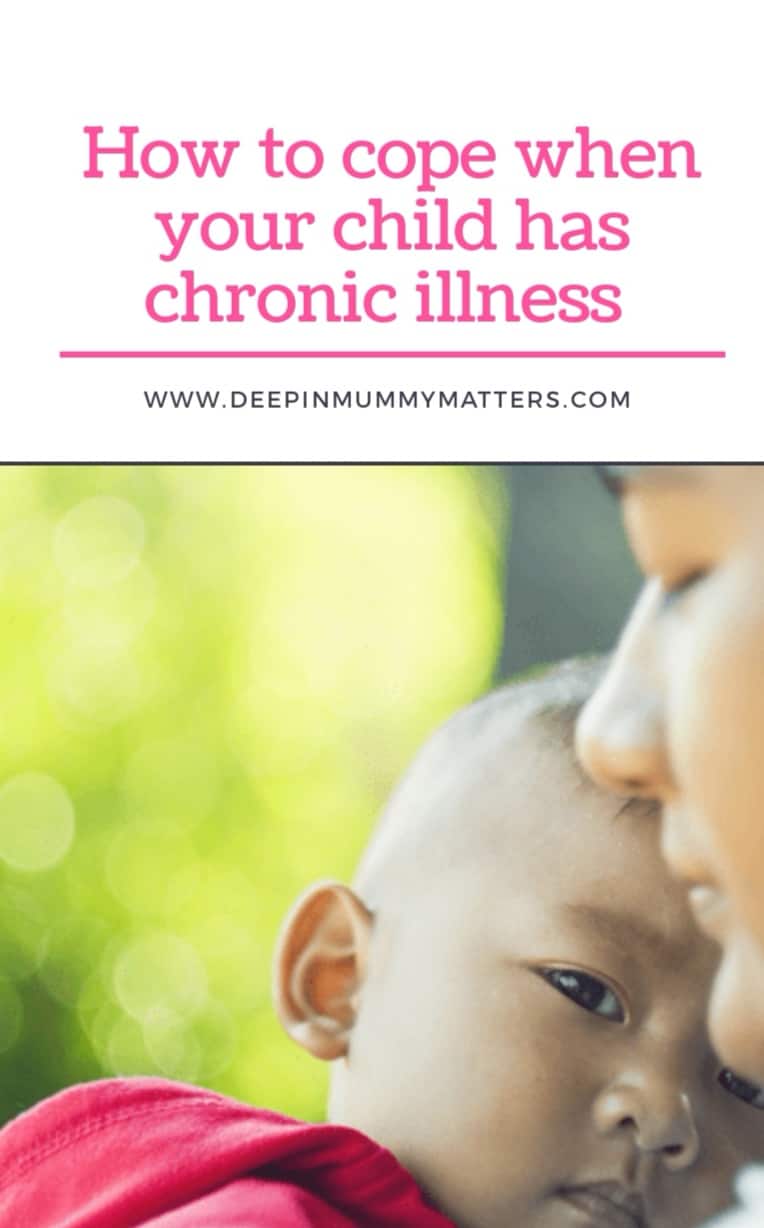When your baby is sick, it can feel as if the world has stopped turning. As if the entire focus of life has telescoped down to this one singular point on Earth. Your child, her sickness, and nothing beyond or outside of this.
When the sickness is acute but temporary, perhaps such anxious, compulsive focus might be manageable. But when your child has a chronic illness, such hypervigilance simply isn’t sustainable.

To help your child enjoy the quality of life they deserve, you have to learn to integrate your child’s illness into your family’s life. You have to figure out how to make the illness a facet of your child’s experience, not the all-consuming centre of your child’s world. Your child’s life may be impacted by his chronic illness, but he doesn’t have to be defined by it. Neither do you. Neither does your family.
Child First, Diagnosis Second
When your baby is diagnosed with a chronic illness, the sickness can become the primary focus. It can be difficult, especially in the adjustment period, to see your child beyond the haze of the sickness and the drive to protect them as much as you possibly can.
So, the first order of business, of course, is to ensure your child is receiving the consistent and quality care they need. But the next thing you are going to have to do is work proactively on what’s going to be your natural desire to overprotect.
Be careful not to let your fears overtake you or allow them to interfere with your relationship with your child. Remember who they were before the diagnosis. Remember they are still that child. And help them to remember that, too. Their fears are likely to be just as great as yours, and they’re going to be taking their cues from you.
You can begin by setting up your environment to be safe and healthy, especially if your child’s condition has compromised their immune system. Deep cleaning and sanitising your home with non-toxic cleaners can help give you, and your little one, the reassurance that home is a haven, a place to play, to learn, to love, and to grow without fear of getting sicker.
Help them to see there are still happy days ahead. Educate yourself and educate your child in an age-appropriate manner to help fight those fears and move forward with knowledge, power, and courage. Above all, spend lots of time with your child helping them to cultivate their interests and enjoy the things they love, things that have nothing to do with the sickness. This will help you, and your baby, remember that they have a life and identity beyond their condition.
Invest in Tech
Your kid doesn’t have to have a chronic illness for you to worry about their safety. Worrying is just built into a parent’s DNA. But when your child is vulnerable because of a chronic illness, it’s like you’ve got parental anxiety on steroids.
The good news, though, is that there’s an app for that. Specifically, there are technologies today that can allow your child to reach you instantaneously if they’re in trouble.
If your child is older, an app like Chaperhome can allow you to stay in constant communication with your kid. You can track their location in real-time and they can send out a call for help at the touch of a button, without even needing to type a message. This can give you the peace of mind to give your child as much independence as possible. This is something every child needs, but especially those with chronic illnesses.
For children who have a chronic illness, that essential sense of autonomy and freedom can be hard to come by. After all, if you spend your entire life being taken care of, you might never develop the self-confidence to believe you can take care of yourself. You might lose the motivation even to try. Helping your child to develop a sense of mastery and control over their own world, to whatever extent is possible for them, will be incredibly empowering for them — and will provide a bit of breathing room for you.
The Necessity of Self-Care
When you are caring for a child with a chronic illness, the stress can feel relentless. And yet you may feel scared, guilty, or even selfish for taking a break when your child can’t take a break from their illness.
Don’t.
Your child needs you to be healthy and strong in body, mind, and spirit. And you can only do that if you take the time to practice self-care if you ensure that you put yourself on your own priorities list.
Chances are, though, that you’re going to need some help in doing this. And that’s okay. Reaching out to the professionals to help you deal with the hurt, fear, and uncertainty you may be facing as you help your child manage their illness can help you avoid emotional exhaustion. Seeking counselling, taking time away, and taking care of yourself will help you to recharge your energy, quiet your mind, and refresh your spirit so that you can continue to be the present and peaceful parent your baby needs.
But it’s not only about seeing to your emotional needs. When your child is ill, you’re also likely facing tremendous fiscal burdens. This is especially true with conditions such as cancer. The good news is that there are financial resources available to help you. After all, when you are caring for a sick child, the last thing you should have to worry about is medical expenses.
The Takeaway
When your child has a chronic illness, it can feel as if your whole world has been narrowed down to a diagnosis. But it doesn’t have to be that way. There are still happy days ahead. Your child’s illness can become a part of your family’s narrative, but not the whole, beautiful, always evolving story.

